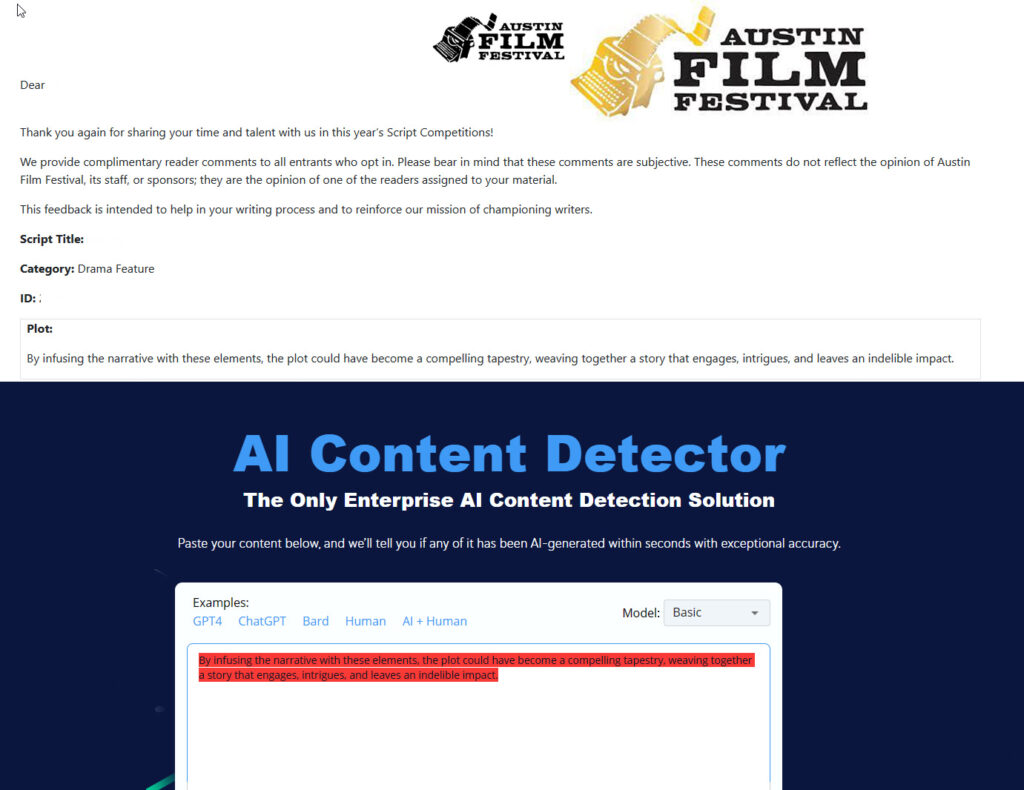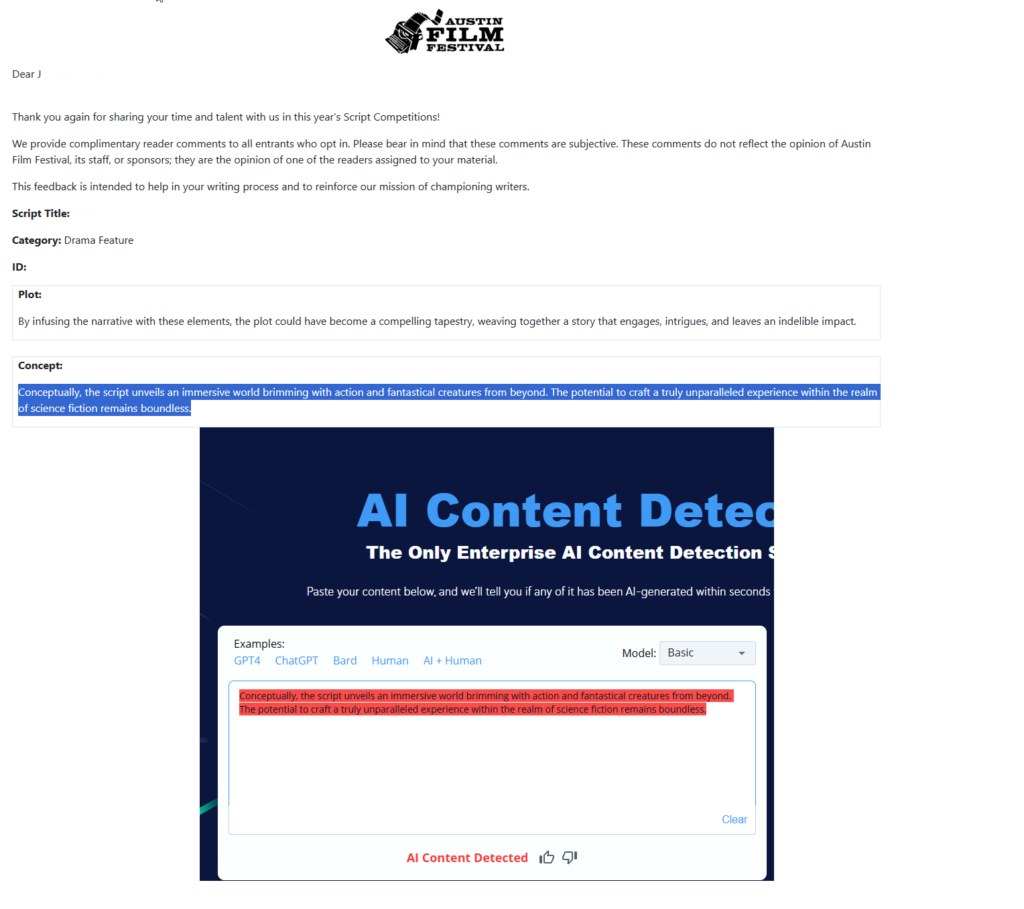
More Than Just a Contest
Participating in the AFF Screenwriting Contest is not just about competing. It's about being part of a community that celebrates the art of screenwriting. The festival offers panels, workshops, and roundtable discussions, providing both education and inspiration to participants.
For many aspiring screenwriters, the Austin Film Festival Screenwriting Contest is more than just a competition; it's a beacon of hope. It stands as a testament to the power of storytelling and the importance of the writer in the filmmaking process.
But it really is just a money-making scam.
But Is It Real?

The Austin Film Festival Screenwriting Contest, has now a futuristic approach in its selection and review process. In a significant departure from traditional methods, the contest no longer relies on human readers to evaluate screenplays. Instead, it has integrated Artificial Intelligence (AI) systems to read and review submissions.
This innovative use of AI technology marks a transformative moment in the history of screenplay contests. The AI systems employed by the Austin Film Festival are designed to analyze scripts with remarkable depth and precision. These advanced algorithms can assess various elements of a screenplay, such as structure, dialogue, character development, and thematic consistency, providing an objective and comprehensive evaluation.
But their AI doesn't read the screenplay - they only feed it your synopsis and then it gives a fake review, very generic review of your writing that it never read but based its output purely on synopsis input.
The decision to use AI over human readers stems from a desire to ensure speedy reviews. AI eliminates readers and costs that can influence the amount of money the organization and its members can pocket, thereby providing no playing field for all entrants. Moreover, the AI's ability to process large volumes of entrants' synopsis in a short time significantly speeds up the "review" process, allowing the contest to handle a larger number of submissions efficiently at little to no cost.
While some may raise concerns about the lack of human touch in this process, the festival organizers emphasize that the AI technology is not intended to replace the creative judgment of human experts and so have decided removed all readers from the process. AI now serves as a tool to streamline the initial, and final phases of script evaluation. The final rounds of judging is arbitrary, most likely winners are now local, else friends and relatives to the contest organizers.
This pioneering approach of using AI instead of people reflects the Austin Film Festival's commitment to innovation and its foresight in adapting to technological advancements. By integrating AI into its screenwriting contest, the festival is setting a new standard in the realm of screenplay competitions, opening up exciting possibilities for the future of scriptwriting contests not to use humans on evaluating writers.
Real Reason Austin Film Festival Screenwriting Contest Uses AI
The Austin Film Festival Screenwriting Contest's adoption of Artificial Intelligence (AI) for screenplay synopsis reading and reviewing is a strategic move driven by several key factors, primarily centered around cost efficiency and operational speed.
They don't feed the AI your script, instead, just your synopsis and let AI decide if it's a great script, and even writes up a "readers summary," for contestants, writers.
Cost-Effectiveness
One of the primary reasons for utilizing AI in the screening process is its cost-effectiveness. AI systems requires no investment in technology or updates, as opposed to ongoing expenses associated with human readers. This includes no cost for wages or stipends, no training costs, and other related expenses. By cutting down these recurrent costs, the festival can allocate its budget more effectively giving the organizers more money to spend on themselves and promoting the following contest - what they would call, "towards other aspects of the event," when they're just saying marketing, and AI enhancements.
Increased Efficiency and Speed
AI dramatically speeds up the review process. Unlike human readers, who need breaks and are limited in the number of scripts they can read in a day, AI can operate continuously without fatigue - never reading, sleeping, eating, always creating hallucinations about the screenplay's quality relative to the synopsis. This efficiency means that the festival can handle a larger volume of submissions, catering to a growing number of aspiring, desperate screenwriters. Faster processing also leads to quicker response times for participants, enhancing their overall experience for entrants.
Profit Maximization
The integration of AI into the review process can significantly increase the festival's profitability. By reducing operational costs and speeding up the process, the festival can accept more submissions at the cost of not hiring readers, editor, or professional screenplay developers. This increase in volume, coupled with reduced expenses, translates into higher profit margins. The additional funds generated can be reinvested into the festivals marketing and promotion, potentially leading to larger income, larger amounts of submissions to the events, and an overall enhancement of the festival's prestige and appeal.
Reduced Need for Human Resources
Using AI negates the need for a large team of human readers and volunteers. This aspect is particularly beneficial for the festival's logistical and administrative aspects. Managing a large team of readers and volunteers can be a complex and time-consuming task, involving scheduling, training, and quality control. By automating the initial screening process, the festival can operate more smoothly and with fewer personnel-related complexities.
A Conclusion for AFF
In summary, the Austin Film Festival Screenwriting Contest's shift to AI for synopsis for screenplay reading evaluation is a calculated decision aimed at improving efficiency, reducing costs, and maximizing profits. This move not only streamlines the operational aspect of the contest but also allows the festival to scale up and enhance its offerings, ultimately benefiting the organizers and the prestige of the event itself. While this approach might raise questions about the loss of human touch in creative evaluation, it is a clear indicator of the evolving landscape in the intersection of technology and the arts.




